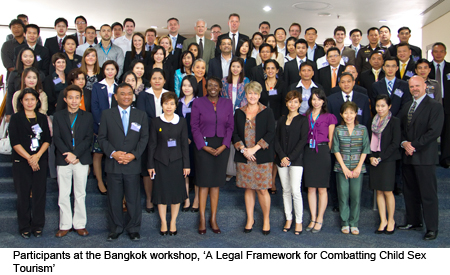
Bangkok (Thailand), 14 March 2012 - Child sex tourism - the sexual exploitation of minors by domestic travelers or international tourists - is a serious problem in many South-East Asia countries, including Thailand. Predators who travel away from home to prey on vulnerable children are often not detected or brought to justice. Often predators use tourism-related services that facilitate contact with children. They maintain anonymity in the community, and exploit loopholes in legislative and law enforcement measures to escape detection.
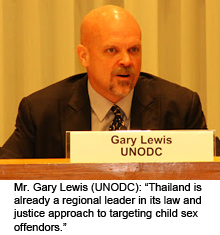 "Child sex tourism is a global challenge, which requires a coordinated domestic and international response," said Mr. Gary Lewis, UNODC Regional Representative for East Asia and the Pacific, at a recent consultation workshop in Bangkok 'A Legal Framework for Combatting Child Sex Tourism'.
"Child sex tourism is a global challenge, which requires a coordinated domestic and international response," said Mr. Gary Lewis, UNODC Regional Representative for East Asia and the Pacific, at a recent consultation workshop in Bangkok 'A Legal Framework for Combatting Child Sex Tourism'.
UNODC, in partnership with INTERPOL, is accelerating a new initiative in four Greater Mekong countries including Thailand to harmonize legal frameworks and law enforcement responses in targetting travelling child sex offenders in the region.
This effort, called Project Childhood, sees UNODC as the primary implementing agency of that project's 'Protection Pillar'. Funded by the Government of Australia (specifically AusAID), the Protection Pillar supports the development of strong law and justice frameworks to bring travelling child sex offenders to justice.
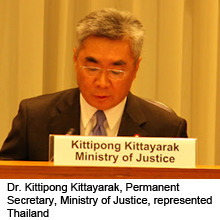 Working with government and NGO partner agencies in Cambodia, Lao PDR, Thailand and Viet Nam, UNODC oversees two components under the Protection Pillar. The first, delivered by UNODC itself, focuses on technical assistance activities to bolster legislative frameworks and law enforcement efforts against child sex tourism. The second, delivered by INTERPOL, supports specialized law enforcement activities, pooling international and regional experience to directly target travelling child sex offenders in the Greater Mekong Sub-region.
Working with government and NGO partner agencies in Cambodia, Lao PDR, Thailand and Viet Nam, UNODC oversees two components under the Protection Pillar. The first, delivered by UNODC itself, focuses on technical assistance activities to bolster legislative frameworks and law enforcement efforts against child sex tourism. The second, delivered by INTERPOL, supports specialized law enforcement activities, pooling international and regional experience to directly target travelling child sex offenders in the Greater Mekong Sub-region.
Representing the Government of Thailand, Dr. Kittipong Kittayarak, Permanent Secretary, Ministry of Justice welcomed UNODC's legal analysis report on child sex tourism, saying, "The findings of the review of the legal framework by the expert consultant of the Project will be of great use for Ministry of Justice to begin looking for effective ways to comprehensively address the issue."
Dr. Kittipong emphasized that "responsive laws and effective enforcement are key infrastructure" and that without both elements, one cannot gain specific understanding of the crime and its dynamics".
The workshop was jointly organized by UNODC and the Thai Ministry of Justice and supported by AusAID through Project Childhood (Protection Pillar).
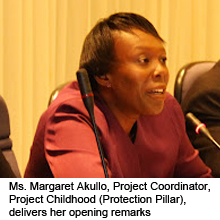 The event, which drew 90 participants, had two objectives: First, to introduce the new regional programme in Thailand. Second, to present the findings of a UNODC legal analysis report which had examined Thai laws related to child sex tourism.
The event, which drew 90 participants, had two objectives: First, to introduce the new regional programme in Thailand. Second, to present the findings of a UNODC legal analysis report which had examined Thai laws related to child sex tourism.
Participants included key officials and representatives from Thailand's Ministry of Justice, the Ministry of Foreign Affairs, the Royal Thai Police, the Office of the Attorney General, the Courts of Justice, the National Child Protection Committee, the Foreign Anti Narcotic and Crime Community of Thailand, as well as local and international non-governmental organizations.
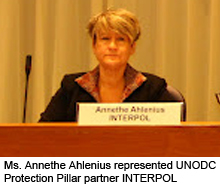 At the workshop, UNODC acknowledged that "Thailand is already a regional leader in its law and justice approach to targeting child sex offenders." According to UNODC, Thailand's draft Law on the Prevention and Suppression of Material Inciting Dangerous Behaviour ― including child sex abuse material ― is also currently under consideration.
At the workshop, UNODC acknowledged that "Thailand is already a regional leader in its law and justice approach to targeting child sex offenders." According to UNODC, Thailand's draft Law on the Prevention and Suppression of Material Inciting Dangerous Behaviour ― including child sex abuse material ― is also currently under consideration.
UNODC commended this important government initiative. "UNODC is proud to be the primary implementing agency of the Protection Pillar of Project Childhood," added Mr. Lewis, who noted that UNODC was pleased to be working in a partnership with INTERPOL and World Vision.
UNODC legal consultant, Ms. Lindsay Buckingham, presented the findings of the UNODC legal analysis report. The report examined whether Thai law and legislative frameworks met international standards and obligations and also addressed key issues such as child pornography, "grooming", and how to implement a protocol on inter-agency cooperation.
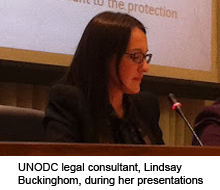 According to report author, Ms. Lindsay Buckingham, what enables law enforcement to both prevent and respond to child sex tourism is "a robust criminal justice framework which reflects key international standards and is effectively implemented at the domestic level."
According to report author, Ms. Lindsay Buckingham, what enables law enforcement to both prevent and respond to child sex tourism is "a robust criminal justice framework which reflects key international standards and is effectively implemented at the domestic level."
UNODC proposed a draft implementation plan to work with key officials in the Ministry of Justice, in order to address the gaps in the current legislative response to identifying, arresting and prosecuting travelling child sex offenders.
BACKGROUND
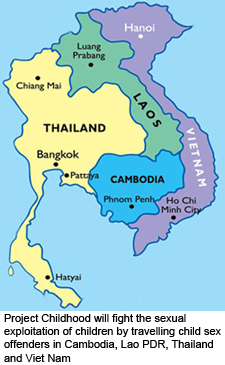 Project Childhood is a $7.5 million Australian AID (AusAID) funded initiative designed to combat the sexual exploitation of children - mainly in the travel and tourism sectors. It covers four countries in the Greater Mekong sub-region: Cambodia, Lao PDR, Thailand and Viet Nam. The project builds on Australia's long-term support for programmes that protect children and prevent their abuse. It is being implemented on the ground by UNODC, Interpol, and World Vision in two complementary pillars - the Protection Pillar (UNODC/Interpol) and the Prevention Pillar (World Vision).
Project Childhood is a $7.5 million Australian AID (AusAID) funded initiative designed to combat the sexual exploitation of children - mainly in the travel and tourism sectors. It covers four countries in the Greater Mekong sub-region: Cambodia, Lao PDR, Thailand and Viet Nam. The project builds on Australia's long-term support for programmes that protect children and prevent their abuse. It is being implemented on the ground by UNODC, Interpol, and World Vision in two complementary pillars - the Protection Pillar (UNODC/Interpol) and the Prevention Pillar (World Vision).